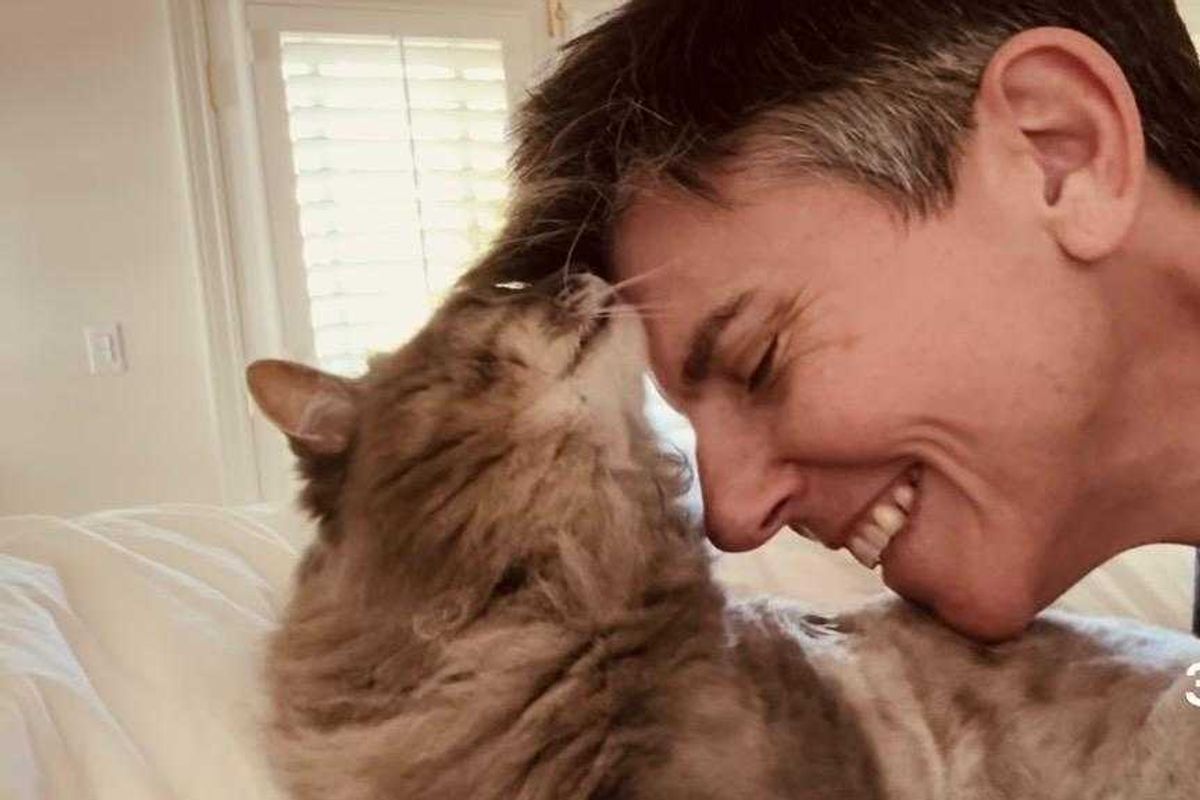You probably haven't heard of nature deficit disorder — but you could still have it.
When's the last time you spent time in nature?

Real nature — not you standing under a tree for shade so you could see your cellphone screen better before hopping your city's subway system.
When was the last time you actually sat on some real green grass, surrounded by living trees, plants, and wildlife that doesn't consist of the pigeon you've named Joe that hangs out on your apartment window?
If it's "been a while," you could actually have something called "nature deficit disorder."

If you have never heard of nature deficit disorder, you're not alone.
While it's not exactly a medical term, according to the man who coined the term — Richard Louv — there are very real problems that result from people losing their connection to nature. "[It’s] a useful term — a metaphor — to describe what many of us believe are the human costs of alienation from nature," he explains over email.
Louv in his garden. Image via Richard Louv, used with permission.
"Human beings have been moving more of their activities indoors since the invention of agriculture then, later, the Industrial Revolution," he explains.
Urbanization has only made the problem worse. Today, over half the world’s population live in urban areas, and according to the World Health Organization, over the next few decades, that number is expected to keep rising.
This means more and more people are living in crowded cities with very little access to parks, grass, or even a playground — which can take a huge toll on health.
Technology also makes everything harder — causing us all to spend more time staring at a screen than a real, live tree. This can wreak havoc on our mental and physical health.
That’s why Louv has spent his career trying to raise awareness for this issue and convince people to spend more time outdoors.
Growing up in Missouri and Kansas, Louv spent much of his childhood playing in the woods with his dog. But as he grew up, he began to realize just how difficult it was for him to find the time to spend outdoors.

Work, family and technology demands just made it tough for him to step away.
In fact, the only way he could "build" nature into his schedule was to take full-on "techno-fasts" with his wife, leaving all electronics behind as they disappeared into the mountains for a few days at a time.
Image by René Reichelt/Unsplash.
Of course, it didn’t take Louv long to realize this struggle to find time for nature wasn’t unique to him or his family, so he decided to throw himself headfirst into researching this problem.
The result was three books, and numerous articles in publications like The New York Times, to plead his case with parents everywhere to make time for nature.
He also co-founded the Children and Nature Network, an organization dedicated to connecting families and communities to nature and the tools they need to make "nature time" a reality.
The good news is that it isn’t hard to "treat" nature deficit disorder — it just takes a little effort and, obviously, some time outdoors.

"We all can create new natural habitats in and around our homes, schools, neighborhoods, workplaces, cities and suburbs, so that, even in inner cities, our children grow up in nature — not with it, but in it," Louv says.
And the truth is, you don’t even have to spend a ton of time outdoors to start feeling the benefits of nature.

Start by looking for your closest park and go there. Take the whole family, and spend the day exploring. Take a hike if you’re up for it, or spend the whole day lounging by a lake.
"We need to schedule nature time," Louv says.
Every little bit helps.

Research shows that even a small dose of nature can reduce stress, lessen negative thoughts, and have positive effects on psychological well-being.
Some studies even suggest that bouts with nature can boost short-term memory, reduce inflammation, and improve your vision.
And for kids, the benefits are even better.
"Studies strongly suggest that time in nature can help many children learn to build confidence in themselves," Louv explains, and it can help calm them down and focus in school.

He notes, "Time spent in nature is obviously not a cure-all, but it can be an enormous help, especially for kids who are stressed by circumstances beyond their control."
Contact with nature, Louv continues, allows children to see they are part of a larger world that includes them.
"Studies show that people who care deeply about the future of the environment almost always enjoyed transcendent experiences in nature when they were children," he says.
Spending time outdoors doesn’t just benefit us individually, it can also transform our relationship with the world around us.

"If nature experiences continue to fade from the current generation of young people, and the next, and the ones to follow, where will future stewards of the earth come from?" Louv says.
It is his hope that by getting parents involved in bringing nature to their kids early and frequently that we can all, collectively, change our relationship to the natural world for the better.



 Meatloaf was a staple dinner.
Meatloaf was a staple dinner. Spaghetti is still a classic.
Spaghetti is still a classic. Why were pork chops so popular?
Why were pork chops so popular?


 First Lady Jacqueline Kennedy greets guests before a reception for the Wives of American Society of Newspaper Editors Members.via
First Lady Jacqueline Kennedy greets guests before a reception for the Wives of American Society of Newspaper Editors Members.via  A gorilla walking on its knuckles. via
A gorilla walking on its knuckles. via 
 Cooking at home is almost always cheaper than eating out, and often significantly so.
Cooking at home is almost always cheaper than eating out, and often significantly so. Bulk spices often cost a fraction of what they cost in jars.
Bulk spices often cost a fraction of what they cost in jars. Growing your own food can save you money.
Growing your own food can save you money. Biking is free.
Biking is free. Public libraries are treasure troves of free items to borrow.
Public libraries are treasure troves of free items to borrow.